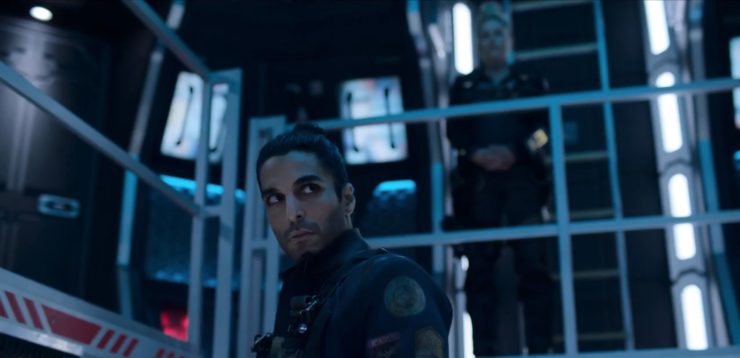Six seasons in, The Expanse is the classic well-oiled machine: The stories are tight and layered, the audience trained to recognize vital details in news reports and quiet details. The actors know their characters inside and out, and the new cast members step into a precisely created world. The effects are better than they’ve ever been. It’s just excellent. How many ways can I say “excellent”? Let’s cross the system and see.
Spoilers for everything up to episode 3, “Force Projection,” below!
This week, the Laconian narrative broadens its scope just a little bit, swooping down from an orbital platform that is decidedly not of human build and whooshing into a schoolroom where a teacher is awfully chipper about how the kids ought to keep an eye out for things that seem strange. Strange like, say, doglike aliens that may or may not be able to repair not just drones, but dead things?
I love that Cara is such an observant kid that she immediately puts things together: The not-a-dog vanished with the bird, and now the bird is upright and chirping. She’s smart enough to do the math, and young enough to see only hope, not anything ominous. I think it’s pretty obvious where her mind is going to go after she learns what happened to her poor brother, but we’re not there just yet.
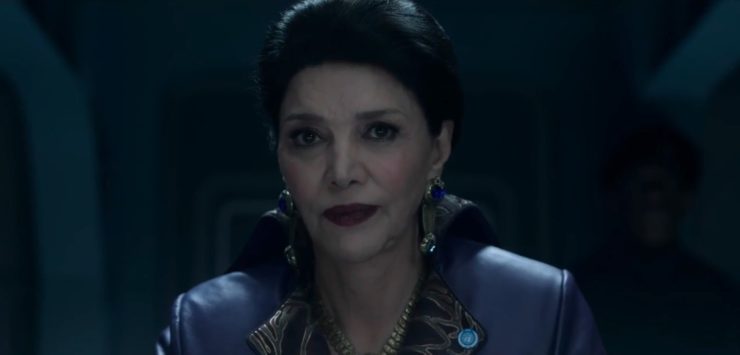
On Ceres, Marco has left a giant mess, and he hasn’t the slightest bit of guilt about it. It is very hard not to see some very uncomfortable parallels to our Earth politics in this situation. Marco will do whatever it takes, including letting the people who are ostensibly “his” die, in order to achieve his version of success. His message changes with the situation: He said Ceres would be his capital, but he tells Filip he just said that because it’s what the people of Ceres needed to hear. There’s no truth to anything. He will win at any cost, even if that cost is other Belters—and to make that fact into something his son might swallow, he finds a way to frame those Belters as not like Marco’s people. They’re not the right ones. They’re disposable.
Meanwhile, Avasarala is trapped between the right thing and the “easy” thing, and it’s no choice whatsoever, no matter what her advisors say, and no matter how much it’s a problem Marco created. If the Inners don’t help Ceres, they are once again nothing but oppressors. If they help Ceres, their people back on Earth will cry foul; why give supplies to the Belters who killed their planet? If they don’t help Ceres, the Belt will lean even more toward Marco. Doing the right thing gets you hated, one way or the other. Doing whatever you want means not having to care, because you still win.
Buy the Book


Sisters of the Forsaken Stars
Seems very possible that winning, as a concept, is overrated.
On the Rocinante, well, a very similar situation is about to play out there, but first there’s time for a handful of intimate moments—the blood of this show, carefully deployed amid the huge crises and flashy battles. Clarissa didn’t have to tell Holden about her mods, her anger, her choices. But after he trusts her with the watch, she seems to feel like she has to offer up every reason why he might not want to do that. She can’t fly the ship. She doesn’t know what to do. And also, she did want to kill him once.
Steven Strait, I must note, looks like hell, exhausted and rasping. His face, as Clarissa gives him every reason not to trust her, is tired, and knowing, and also warm. “Everybody on this ship has something they regret,” he says. “Including Amos. I think.”
Regret isn’t welcome anywhere else. There’s no room for regret on the Pella; in the face of something that might need regretting, Marco just changes the narrative. Chrisjen Avasarala has no time for regrets; there’s too much to do, too many things to balance. The Rocinante is neither here nor there at the start of this episode, but en route to Ceres, in a moment of calm. Clarissa can confess. Bobbie and Amos can bicker, gently, and bond over terrible food. And Naomi can tell Jim what happened when she froze up in the airlock.
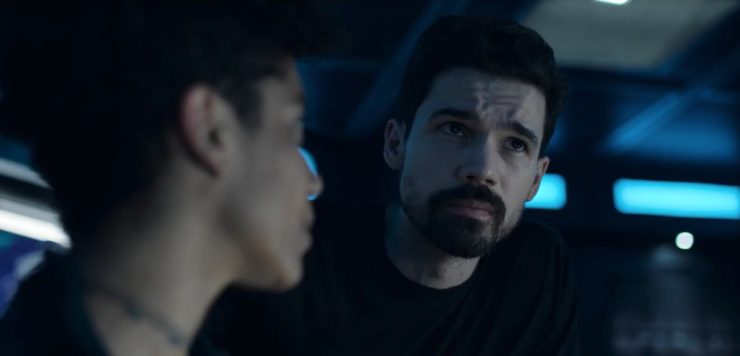
I love this moment between the two of them. It’s very clear what happened to Naomi, and the audience doesn’t really need reminding. But we do need this exchange between Jim and Naomi. It would’ve been weird for them not to talk about it, and when they do, it’s all honesty and acceptance and complete understanding. There is no getting away from what one’s body does. But you can distract a person whose mind might still be chewing on what happened.
If there’s a weakness to this season so far, it’s the whole issue of the ships and the gates, which always comes across as a little bit of an infodump no matter the context or the conversation. It’s important, it has to happen, it has to be talked about, but these exchanges always feel like a bit of a tonal shift. Not terrible, just a little out of step with everything else. Naomi, of course, throws herself into the data and begins to see a pattern.
And then everything goes to hell.
The battle sequence between the Pella and friends on one side and the lone Rocinante on the other is a gorgeous work of economical storytelling. No second is wasted: We’re in it, we’re with the crew, we’re perfectly aware of what is happening and how, and also of how this battle takes place across huge distances in a vacuum—information isn’t immediate, shots can be dodged, and humans can make mistakes, no matter how much of the process is automated through the ships’ computers. (That line Holden has when he puts Clarissa on watch, about how the Roci does most of the work flying from point A to point B—I feel like it’s echoed here in how much the Pella does in terms of tactical planning, how much of the Roci’s defense is automated, too.)
Every time Holden puts the ship through that drastic spin in order to fire on the Pella, the sight is stunning—and Amos and Clarissa show us just how much pressure it creates, how hard it becomes to do one’s job in that situation. Every difference between the two ships is drastic: Holden’s tiny crew versus the full Pella; Marco’s drive to kill the Roci versus Holden’s reluctance to destroy his enemy’s ship.
And that’s before he knows for sure that Filip is onboard. Before Marco, that canny bastard, makes sure everyone on the Roci knows who will die if they blow up his wounded ship.
Everyone, that is, except Bobbie, who doesn’t recognize the intimacy of the situation and fires anyway, only to have the missile disarmed by Holden.
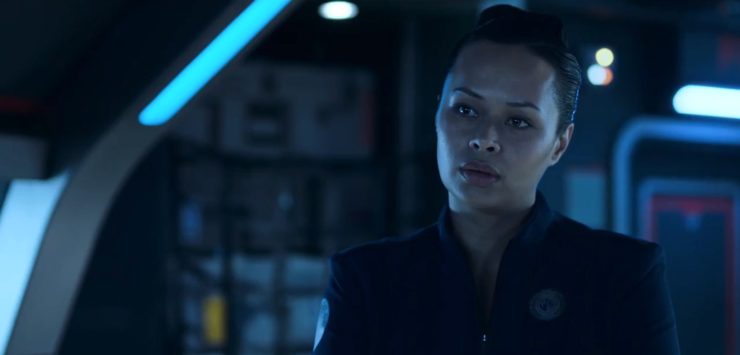
This sequence is beautifully shot, but what makes it a knockout is, as ever, the way it’s layered. There’s an immediate conflict between two forces; there are conflicts among each side, too, personal and driving and maybe irreconcilable. Filip is drawing away from his father, as he shows (to my great satisfaction) when he challenges Marco on the bridge. He’s not just arguing with his father; he’s sowing little seeds of doubt among Marco’s crew.
And on the Roci, the problem of Ceres repeats itself—a no-win situation in which a brutally practical choice is at odds with compassion, with love, maybe with humanity itself. Holden could not have let Filip die in that moment. Okay, technically, he could have. But it would change everything. Not just his relationship, but something at the core of who he is.
When Prax (Terry Chen) sends Amos a message, it makes Amos think. Prax takes a huge risk to get a message out, though there’s nothing in it for him. “He’s just a good guy,” Amos says, sounding almost surprised. “That’s what it always takes,” Bobbie says. And the way she says it, it sounds like she doesn’t really consider herself one of those good guys.
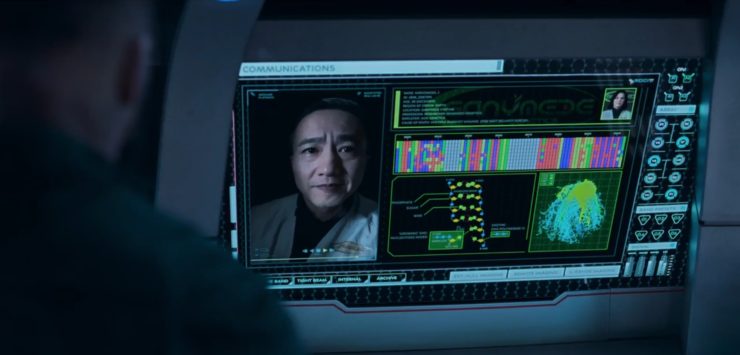
Holden, when he disarms that missile, also takes a huge risk. The Pella could turn around and blow the Roci out of the sky. Marco lives to fight another day, to kill more people, to wage more war. He might be right that Marco as a martyr would be a disaster, but that’s not why he makes the choice he makes. Is he being a good guy? (Who decides what makes a good guy?) Is it too personal? Should this choice have even been his to make?
Ever since he logged that distress call on the Canterbury, Holden has been making choices that have huge consequences for people. Maybe he doesn’t want to be the person making those choices, but here he is. Again. But so much has changed since the Cant, which gets brought up in this episode precisely to make us think about all that change. No one is who they used to be. Not even Amos, who makes his own choices now, no longer looking to Naomi for guidance. Back on the Cant, Holden had a youthful self-righteousness, a certainty about what the right thing was. Over the last five seasons, the writers have sanded that off him, piece by piece, and Strait has done subtle and understated work that lets us see just how hard it can become, as you age and learn and grow, to be certain that you’re right.
In early seasons, The Expanse sometimes let Holden (or Miller) be the main character, and one of the joys of watching this show over so many years is how the writers have grown Holden out of that role and explored the space that makes for everyone else to grow around him. The narrative expands, it contracts, it puts huge decisions into Holden’s hands and takes choices away, it asks us again and again to consider what makes a person change, and how they come to make new or different choices. Last season, Naomi and Amos took center stage and Holden flew in their wake, narratively speaking. This season, with everything in massive crisis mode, there’s no room for main character energy. Avasarala is no longer acting alone, but part of a team that includes Martians. Monica has been brought in and onto that team. The Roci crew, though sometimes they chafe at it, are part of that team, and they are family, too.
All of this, though we’re still three books (and several decades) ahead of the end of the novels, is beautifully and thematically in keeping with how the whole series winds up. It’s one of the benefits of working from a finished story: the showrunners know where they’re going, and what’s more, they clearly know how to get there. The little news reports, the side arguments, the way people struggle with their innate and learned natures—every episode rewards repeat watching. I never stop marveling at just how much there is to see.
Only Marco is still trying to stand alone, to be the star in his own story. And we just saw how well that’s working out for him. But once again, there are tricks up his sleeve. Can’t wait to find out what that new ship is for.
SPACE FLOTSAM AND JETSAM
- I literally yelled “ANNA!” when Elizabeth Mitchell’s character turned up on the news. I love Pastor Anna. I loved her heartfelt little speech about how in a disaster, people at first want to help, but when it drags on, we forget that feeling. I felt like she was talking to us, now, as our own disaster drags on. Nice work on your news report, Monica.
- Also, PRAX! We first get a little hint of this subplot on another news report, and I’m so glad to see it’s still squeezed in here. Plus we got that great moment of watching Amos watch Prax while being aware of Bobbie’s impatience. “Give him a second, he’ll get around to it.”
- I would just like to take one second to note that I love Jo Vannicola as Nico Sanjirani, though I continue to be disappointed that Anderson Dawes apparently died offscreen (presumably Jared Harris was busy). Or is Marco just saying that? Without Fred Johnson around keeping tabs on all the OPA guys, who’s to know?
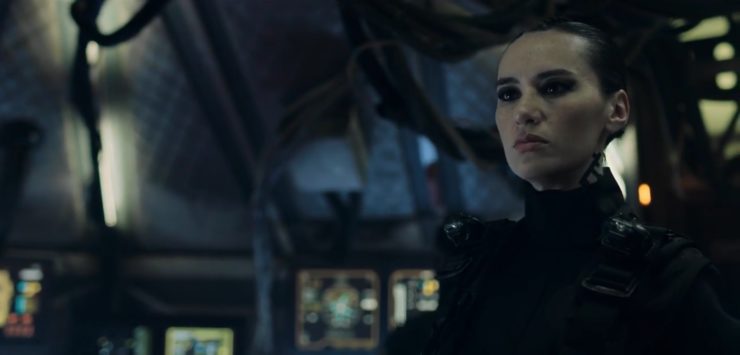
- Not a lot of time spent on the Tynan this week, but there is one perfect moment: Drummer snapping “Did I ask you?” at Walker when he says he can see why she’d want Michio—who is arguing with Josep about what the Belt has done to Earth—off the ship. It’s such a careful way to tell him to fuck off without suggesting she might agree with Michio. Her response renders the argument irrelevant; you simply do not presume to tell Camina Drummer anything about how to run her ship.
- “Force Projection” doesn’t return to Ceres after that awful series of explosions. I am worried about Monica and the Belter and also DO NOT HURT THE NICE SPACE CAT.
[Please note that comments will be temporarily closed over the holiday break, but will be open for discussion on Monday, January 3rd.]
Molly Templeton lives and writes in Oregon, and spends as much time as possible in the woods. Sometimes she talks about books on Twitter.










